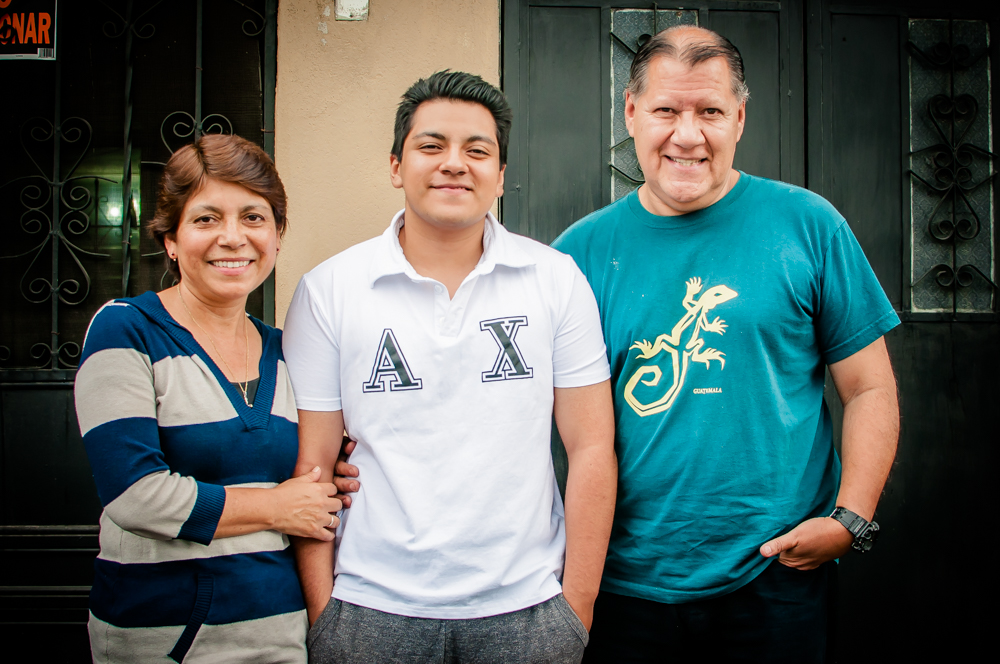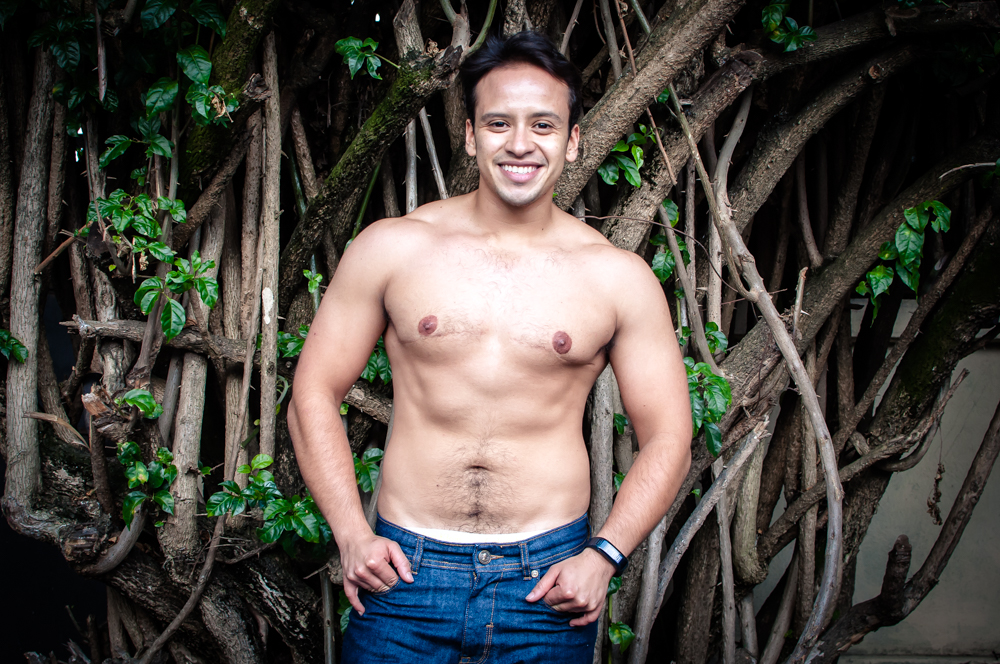HAZ CLICK EN CUALQUIERA DE ESTOS RETRATOS PARA CONOCER SUS HISTORIAS.
CLICK ON ANY OF THESE PORTRAITS TO GET TO KNOW THEIR HANDWRITTEN TESTIMONIES.
En una sala de conferencias en Ciudad de Guatemala, Alex Castillo se presentó delante de un grupo de trabajadores del Ministerio Público y les explicó lo que significa ser transgénerx en un país sin protecciones legales para personas como él. Hizo click en su presentación de Powerpoint y una imagen de su propio documento de identidad aparece con una gran discrepancia: una “F” donde debió haber habido una “M”.
La sala era un espacio seguro para empleadxs del gobierno, y Castillo se aseguró que todxs entendieran que era un espacio para aprender y no habían preguntas equivocadas. Castillo y sus compañerxs de Asociación Lambda han entrenado más de 1000 empleadxs públicos y oficiales de la policía en el país. Él utiliza su propia vida y cuerpo para entrenar estxs estudiantes. En muchos casos, esta clase es la primera vez que estxs empleadxs públicxs recibirán algún tipo de educación sexual, especialmente hacia el tema trans.
Lxs estudiantes de Castillo trabajan para el Estado, y en muchos casos son la primera línea del gobierno interpretando leyes en vivo. Son lxs oficiales de la policía deteniendo gente en la calle, decidiendo como responder a casos de discriminación. Son oficiales decidiendo si encarcerar a una persona trans en la cárcel de mujeres o de hombres a pesar de la falta de regulación. Son quienes reciben las denuncias por violencia a adolescentes trans sin una normativa clara en como proceder, porque las personas LGBTQ no tienen protecciones.
Guatemala es un país peligroso para la comunidad transgénerx donde las vidas LGBTQ no están protegidas por la ley. Según un estudio realizado por HIVos, 71 por ciento de las mujeres trans en Guatemala dicen haber sido víctimas de discriminación, 60 por ciento dice haber experimentado abuso físico, y 61 por ciento gana menos del sueldo mínimo. Otro estudio de Red Lactrans refleja que el 70 por ciento de las personas trans dicen haber sido rechazadxs de sus grupos familiares y echadxs a la calle.
Justo ahora, hay una propuesta de ley abriéndose paso en el congreso que permitiría a las personas trans cambiar el sexo en su carnet de identidad. Pero, hay otra propuesta de ley que haría ilegal para cualquier organización, pública o privada, enseñar educación sexual a menores de edad. El trabajo que Lambda hace en el país es importante y necesario, pero lxs trans guatemaltecxs siguen vulnerables a la violencia, discriminación y violación de sus derechos fundamentales.
Un joven trans que participó en el proyecto, nos contó como su familia trajo un sacerdote para que lo exorcizara, y otros tantos jóvenes nos contaron que fueron echados de sus planteles educativos por su identidad de género. Muchos de los hombres trans nos contaron que han perdido contacto con sus familiares y que les cuesta mucho conseguir empleo porque sus identidades los dejan en evidencia y nada los protege de la discriminación. Muchxs a quienes conocimos quieren llevar una vida bajo perfil, libre de acoso, pero sin poder cambiar el sexo en su identificación, vivir bajo perfil no es una opción.
Estamos muy agradecidxs a la comunidad trans masculina de Guatemala que nos recibió para contarnos sus historias. Es un acto de valentía así mucha gente aún no sepa que eres trans. No hay palabras que describan nuestro agradecimiento.
In a conference room in downtown Guatemala City, Alex Castillo got up in front of a group of employees from the federal prosecutor’s office and explained what it meant to be transgender in a country without legal protections for people like him. He clicked next on his power point presentation, and an image of his own government-issued identification showed up with a glaring discrepancy: An “F” where there should have been an “M.”
The room was a safe space for the government employees, and Castillo made sure everyone understood that this was a place of learning and there were no wrong questions. Castillo and his colleagues at Asociación Lambda have trained more than 1000 state workers and police officers across the country. He uses his own life and body to teach and train these students. In many cases, this class is the first time these government employees will receive any kind of gender and sexuality education, especially about transgender issues.
Castillo’s students work for the state, and in many cases are the frontline of the government, interpreting laws in real time. They are police stopping people in the street, deciding how to respond to discrimination cases. They are the officers deciding whether to jail a transgender person in the female or male section of a prison despite a lack of regulations for that situation. They are the caseworkers receiving complaints of violence from transgender teens without formal rules for how to proceed when LGBTQ people have no protections.
Guatemala is a dangerous country for the transgender community, and LGBTQ lives are not protected by law. According to a study by HIVos, 71 percent of transgender women in Guatemala report experiencing discrimination, 60 percent have reported experiencing physical abuse, and 61 percent earn less than minimum wage. Another study by Red Lactrans noted that as many as 70 percent of transgender people say they were kicked out of their family homes.
Right now, a proposed bill making its way through congress that would allow transgender people to change the sex on their identity cards. But, there’s also a proposed bill that would make it illegal for any organization — public or private — to teach sex education to minors. The work that Lambda does across the country is important and necessary, but trans Guatemalans remain vulnerable to violence, discrimination, and the violation of their basic rights.
One young trans man who participated in the project, told us his family had brought a priest to exorcise him, and several other young teenage trans men were kicked out of school because of their gender identity. Many of the men we spoke to told us they had lost connections to their families and have had a difficult time finding work because their IDs out them on every job application, and they have no protection against discrimination. So many trans people we met want to pass and live a life free of harassment, but without the ability to change their sex on their identification, living stealth isn’t an option.
We are incredibly grateful to the Guatemalan trans masculine community that received us and told us their stories. It is an act of bravery whether you are out in your community or not. We cannot profess our appreciation enough.











